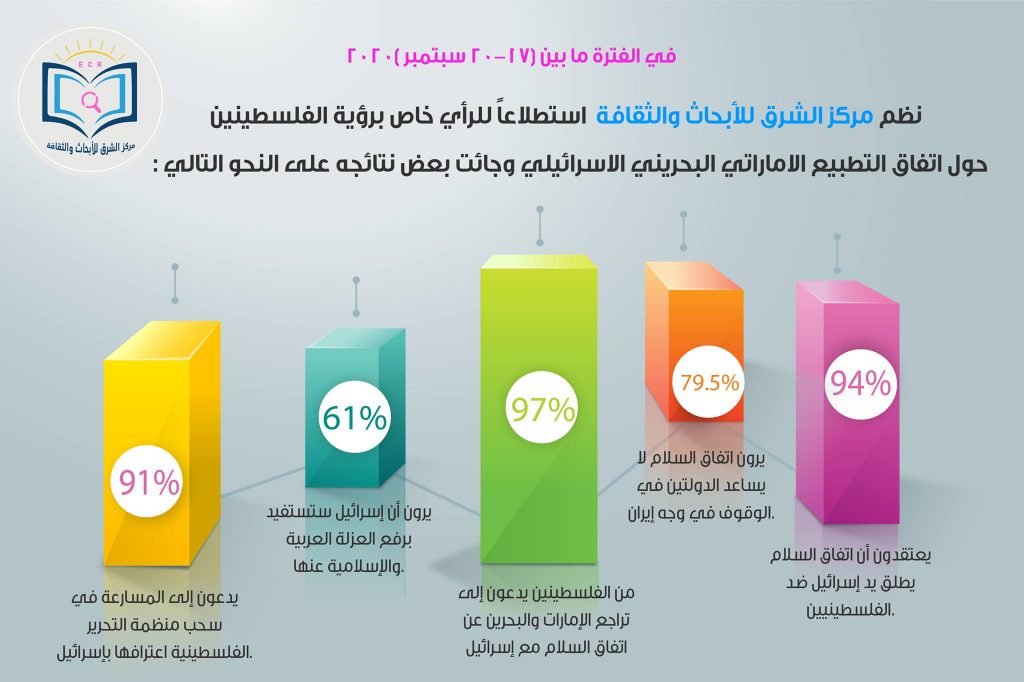Poll
The Palestinians’ vision for the UAE-Bahrain-Israel peace agreement
The East Center for Research and Culture conducts opinion polls on political and social issues, To inform public opinion, researchers and politicians about the attitudes of the groups surveyed towards various issues.
In light of the signing of the UAE-Bahraini-Israeli peace agreement under American auspices, It is an event that caused a great stir and mixed and convulsive reactions in the Arab world, But in many interested countries of the world, The Orient Center for Research and Culture conducted this poll with the aim of finding out the opinion of the Palestinian street and its societal and intellectual forces about this agreement. and their view of him.
Al Sharq Center for Research and Culture is keen on impartiality and complete objectivity in all its surveys. Therefore, no name or address is asked, No personal information is collected about the people surveyed. With the aim of giving the respondent the greatest degree of personal security to reach objective and abstract answers.
The survey questions were directed to specific Palestinian groups in the West Bank, Gaza Strip and Amman City through funded and unfunded advertising through a special link that is not displayed on PCHR’s website page. A total of 171 people answered the survey.
The poll was divided into two axes:
The first axis dealt with the basic information of the surveyed groups, such as gender, age, and the state.
The survey included 155 males, and 16 females, This reflects a lack of female interest in polling issues in general.
In terms of age groups, 25 young people between 18-35 years old answered the survey. and 74 men between 36 and 60 years old, and 49 elders over 60 years old, It is a distribution that largely reflects the maturity of the surveyed groups.
The second axis dealt with the subject of the survey, It included thirteen questions, Distributed over 5 topics:
First Topic: Palestine Liberation Organization
117 people, or 68.4%, indicated that the PLO’s recognition of Israel gave justification to Arab countries for recognition. While 54 people rejected it (31.6%). This indicates that a significant percentage of Palestinians polled by more than 31% believes that Arab countries should not sign peace agreements with Israel even if they do sign the PLO. This means seeking an excuse and admissible objective reasons for the PLO’s recognition of Israel.
On the other hand, the Oslo generation, who were born and raised, are accustomed to seeing normal relations between the Palestinian Authority and Israel. The UAE-Bahrain peace agreement with Israel was the first Arab-Israeli peace agreement they saw. They did not realize the historical background of this work, which Egypt was the first to do, then the PLO and Jordan. This category of Palestinians has overlooked the invocation of the PLO recognition by Emirati and Bahraini officials and the Oslo Accords. It is a word of truth with which I want falsehood.
154 (90%) confirmed that the organization erred in recognizing Israel before obtaining Palestinian rights. 17 people (10%) opposed them. The small percentage that believes that the organization did not make a mistake indicates two possibilities: First: They believe that the organization had no choice but to recognize Israel in order to have a physical presence on Palestinian territory and transfer the official Palestinian struggle inside, and the establishment of new rules of action vis-à-vis Israel. And the second possibility: They believe that the PLO has already obtained Palestinian rights or many of them through Israel’s recognition of the Palestinian people and PLO representation.
And through the establishment of the Palestinian Authority with its various institutions. Both possibilities point to a short-sighted view that did not comprehend the scene for what it really is. The intifada of the Palestinian people since 1987 almost forced Israel to withdraw from the West Bank and Gaza without an agreement. In other words, the PLO had other options, the most important of which was the continuation of the popular struggle. On the other hand, the most important national issues have not been accomplished, such as the issue of land, the cessation of settlements, Jerusalem, refugees, sovereignty, economic disintegration, and others.
152 (89%) said that the PLO’s withdrawal of its recognition of Israel at this time was an urgent necessity. While 19 people disagreed, 11%. This large percentage of respondents puts a possible national option for the Palestinian leadership in the face of the accelerating Arab normalization train. A withdrawal of the PLO from the Oslo Accords and its withdrawal of recognition of Israel would remove the pretexts from any Arab state contemplating normalization with Israel on the grounds that the Palestinians had already done so.
Second Topic: Arab Damages:
On the economic level, 149 (87%) said that peace with Israel harms the UAE’s and Bahrain’s economic interests. While 22 people opposed them (13%). At the security level, 159 people, or 93%, said that the agreement harms the security interests of the UAE and Bahrain. While 12 people opposed them at 7%.
In these cases, a small percentage of respondents believe that the UAE and Bahrain could achieve economic and security interests from Israel, although they may have known that the peace of Egypt, Jordan and the PLO with Israel did not bring these countries any economic or security benefits. Thus, there is a state of lack of awareness or clear ignorance among these groups, In addition, this group ignores the fact that the UAE and Bahrain are very rich countries and do not need to justify the agreement by seeking economic benefits.
Poll on Palestinian Opinion of the UAE-Bahrain-Israel Agreement
Third Topic: Arabic Benefits:
18 people, or 10.5 percent, said the peace agreement would increase the UAE and Bahrain’s access to advanced weapons and technology. While 153 people opposed them (89.5%). 20 people, 12 percent, saw the possibility of increasing the chances of the UAE and Bahrain gaining international influence from their desire for peace with Israel. 151 people opposed them (88%). This indicates that a small percentage of respondents believe that peace with Israel brings military, technical, and political benefits to the UAE and Bahrain.
35 people, or 20.5%, believed that the peace agreement serves the UAE and Bahrain in standing up to Iran. While 136 people opposed them, 79.5% believe that the peace agreement does not help the two countries stand up to Iran. Here, we note that a larger percentage of opponents of the agreement see a partial implicit interest of the two countries of the agreement towards the Iranian threat. But the vast majority does not see the agreement as protecting the two Gulf states from Iran. Or they don’t see an Iranian threat to the Gulf states at all, It is only a pretext for Emirati and Bahraini officials to normalize with Israel.
136 people, or 79.5%, confirmed that the agreement guarantees the rulers of the UAE and Bahrain continued American support for them. This was denied by 35 people (20.5%) as they see it as not guaranteeing the two countries continued U.S. support for their rulers. We note the result of these two questions (Iran and America) are completely opposite, Those who see the agreement have nothing to do with Iran see it as having a lot to do with America. And vice versa
Fourth Topic: Benefits of Israel
105 people, or 61.4%, said that Israel would benefit from the agreement with the UAE and Bahrain and lift Arab and Islamic isolation from Israel. While 66 people opposed them (38.6%). The opponents’ answer seems rather strange, The first application to lift the international isolation of Israel is the signing of a peace agreement by two Arab states with Israel. There are hadiths about other countries in the coming days.
The opposition minority may believe that Israel does not suffer from Arab and Muslim isolation in the first place. It maintains trade and security relations with many of these countries without agreement.
161 (94%) of people believed that the peace agreement frees Israel’s hand against the Palestinians. 10 people opposed them and 6% believe that the agreement does not harm the Palestinians even if it does not bring them any benefits. This tiny minority may have believed that the UAE-Bahrain-Israel agreement would stop Israel’s hands from gnawing at the West Bank, as claimed by the leaders of the two Gulf states. This was denied by Israeli Prime Minister Benjamin Netanyahu, It is not addressed at all in the written peace agreement between the three countries.
Poll on Palestinian Opinion of the UAE-Bahrain-Israel Agreement
Fifth Topic: Position on the Peace Agreement
166 people, 97 percent, called for the UAE and Bahrain to reverse the peace agreement with Israel. 5 people opposed them (3%) as they prefer the continuation of the peace agreement.
155 people, 91%, called on the PLO to quickly withdraw its recognition of Israel. While 16 people offered them at a rate of 9%. It has been noted that some of the Palestinians surveyed ask the UAE and Bahrain what they do not ask the PLO. While 97% demanded that the Dawatin withdraw from the agreement, Only 91% asked the PLO to do so. This could mean that the difference between the two percentages (6%) believes that the organization’s continued recognition of Israel or delay its withdrawal from recognizing Israel, It has an interest in the Palestinian cause.
It may be a state of denial experienced by some Palestinians, They do not believe that the struggling PLO has fallen into the mud of recognizing Israel. In any case, the majority of the arena sees the withdrawal of the organization, the UAE and Bahrain from recognizing Israel.

The bottom line
The poll was limited to the Palestinians’ opinion of the UAE-Bahraini-Israeli agreement on the West Bank, the Gaza Strip and the Jordanian capital city of Amman. 171 people answered, 91% were male and 9% female, The poll included five axes:
90% believe the organization erred in recognizing Israel before obtaining Palestinian rights.
91% call for the PLO to withdraw its recognition of Israel
93% view the UAE-Bahrain agreement as harming their security interests.
68.4% believe that the PLO’s recognition of Israel gave justification to Arab countries to recognize it.
61% believe that Israel would benefit from lifting its Arab and Islamic isolation.
94% believe that the peace agreement gives Israel free hands against the Palestinians.
79.5% believe that the peace agreement does not help the two countries stand up to Iran.
79.5% of respondents believe that the peace agreement guarantees the rulers of the UAE and Bahrain continued American support for them.
97% support the UAE and Bahrain to withdraw from the peace agreement with Israel.
[/et_pb_text][/et_pb_column]
[/et_pb_row]
[/et_pb_section]







